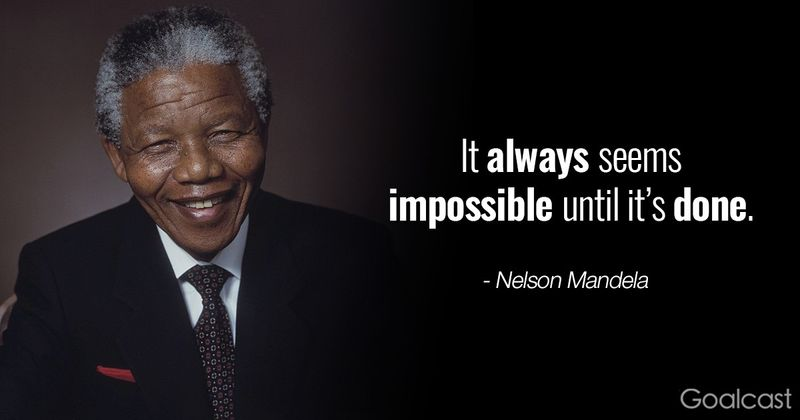Nelson Mandela, a revolutionary, political prisoner, and South Africa’s first Black president, dedicated his life to justice, freedom, and reconciliation. Behind his extraordinary achievements was a clear sense of purpose and a disciplined, strategic approach to achieving long-term goals—offering a powerful blueprint for anyone seeking to create meaningful change in their own life.
The Power of Purpose
Born in 1918 in the rural village of Mvezo, Nelson Mandela rose from humble beginnings to lead a decades-long struggle against apartheid, the brutal system of racial segregation in South Africa. As a lawyer, activist, and eventually president, Mandela’s vision was always clear: to create a free and democratic South Africa where people of all races could live together in equality.
What made Mandela successful was not only his ideals, but his disciplined pursuit of them. His unwavering commitment, ability to strategize, and willingness to adapt made him one of the most effective leaders of the 20th century.
As Mandela once said:
“I have walked that long road to freedom… I have taken a moment to rest, but I can only rest for a moment, for with freedom comes responsibilities.”
He was not just a dreamer—he was a doer, and his approach to goal-setting can be applied by anyone striving for meaningful change in their own life.
Mandela’s 5 Goal-Setting Strategies
1. Define a Purpose-Driven Vision
Nelson Mandela’s goals were never about personal power or fame—they were deeply tied to a cause greater than himself. His core vision was a non-racial, democratic South Africa where all citizens had equal rights and opportunities. This clarity of purpose kept him grounded, even during his most challenging years in prison. It helped him resist bitterness and maintain a long-term focus, despite immense personal sacrifice. Mandela’s purpose gave his actions meaning, and in turn, inspired millions.
2. Break Big Goals into Milestones
Mandela didn’t try to achieve freedom for South Africa in a single leap. He approached it in stages—educating himself in law to fight injustice within the system, helping form the ANC Youth League to energize a new generation of activists, organizing campaigns against apartheid laws, and eventually leading negotiations for peace. Each milestone marked strategic progress. Even in prison, he treated each improvement—better conditions, more contact with the outside world—as steps toward his broader mission.
3. Adapt Tactics Without Abandoning Principles
Throughout his life, Mandela showed a remarkable ability to adapt. He began as a firm believer in nonviolent protest, but after repeated violent crackdowns by the apartheid regime, he co-founded Umkhonto we Sizwe, an armed wing of the ANC. Yet even as he accepted violence as a last resort, he never lost sight of the moral high ground. Later, during negotiations with the government, he transitioned again—choosing reconciliation and forgiveness over revenge. Mandela adjusted his methods to the moment, but never compromised on the goal of justice and equality.
4. Practice Long-Term Patience and Persistence
Few people have demonstrated patience like Mandela. Spending 27 years in prison, he faced isolation, hard labor, and harsh conditions. Yet he didn’t see this as lost time. He studied, reflected, and strengthened his leadership from within prison walls. When freedom finally came, he was not consumed by rage or a desire for vengeance—he was ready to lead a fractured nation toward healing. Mandela’s story reminds us that the most meaningful goals often take years to realize, and staying committed through setbacks is essential.
5. Lead Through Integrity and Service
Mandela’s leadership was rooted in humility and service, not ego. After achieving the presidency in 1994, he chose to serve only one term, setting a powerful precedent for peaceful, democratic transition in Africa. He used his influence to unite former enemies and build a foundation for future generations. Even after retirement, he continued advocating for peace and education globally. His consistent integrity—doing the right thing, even when it was hard—built trust and lasting change. For Mandela, achieving a goal was never just about reaching the top, but lifting others up along the way.
Applying Mandela’s Wisdom to Your Own Goals
Mandela’s life may seem extraordinary, but his principles can guide anyone working toward personal or professional goals. Here’s how to apply his wisdom:
1. Start with a Clear “Why”
Think deeply about the purpose behind your goal. Whether you want to change careers, improve your health, or build something new, tie it to something meaningful. A strong “why” gives your goal staying power.
2. Break Goals into Steps
Instead of focusing only on the big result, identify the small wins along the way. Like Mandela, take your journey in phases. Set weekly, monthly, and quarterly milestones to stay motivated and track progress.
3. Be Flexible with Your Approach
If something isn’t working, don’t quit—adjust. Change the plan, not the goal. Mandela’s ability to pivot kept his mission alive even under extreme conditions.
4. Cultivate Patience
Real change takes time. Stay committed even when things are slow or hard. Mandela didn’t measure progress in weeks or months—he thought in years. Your persistence matters more than quick wins.
5. Lead Yourself with Integrity
Be honest with yourself. Hold yourself accountable. Follow through. Even when no one is watching, the discipline you build creates strength for when it really counts.
It Always Seems Impossible Until It’s Done
Mandela famously said:
“It always seems impossible until it’s done.”
His life proves that no goal is too big when pursued with purpose, patience, and courage. Whether you’re working to change your life, lead others, or overcome personal challenges, Mandela’s approach offers a timeless strategy.
Start with your values. Break your goal into steps. Adjust your path when needed. Stay patient. Lead with integrity.
You don’t have to be a revolutionary to change the world—just someone committed to a worthy goal, willing to take the first step.
